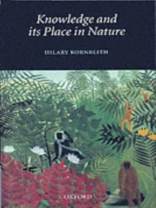Philosophers have traditionally used conceptual analysis to investigate knowledge. Hilary Kornblith argues that this is misguided: it is not the concept of knowledge that we should be investigating, but knowledge itself, a robust natural phenomenon, suitable for scientific study. Cognitive ethologists not only attribute intentional states to non-human animals, they also speak of such animals as having knowledge; and this talk of knowledge does causal and explanatorywork within their theories. The account of knowledge which emerges from this literature is a version of reliabilism: knowledge is reliably produced true belief. This account of knowledge is not meant merely to provide an elucidation of an important scientific category. Rather, Kornblith argues that knowledge, in this very sense, is what philosophers have been talking about all along. Rival accounts are examined in detail and it is argued that they are inadequate to the phenomenon of knowledge (even of human knowledge). One traditional objection to this sort of naturalistic approach to epistemology is that, in providing a descriptive account of the nature of important epistemic categories, it must inevitably deprive these categories of their normative force. But Kornblith argues that a proper account of epistemic normativity flows directly from the account of knowledge which is found in cognitive ethology. Knowledge may be properly understood as a real feature of the world which makes normative demands upon us. This controversial and refreshingly original book offers philosophers a new way to do epistemology.
Hilary Kornblith
Knowledge and its Place in Nature [PDF ebook]
Knowledge and its Place in Nature [PDF ebook]
购买此电子书可免费获赠一本!
语言 英语 ● 格式 PDF ● ISBN 9780191529849 ● 出版者 Clarendon Press ● 发布时间 2002 ● 下载 6 时 ● 货币 EUR ● ID 2273182 ● 复制保护 Adobe DRM
需要具备DRM功能的电子书阅读器












